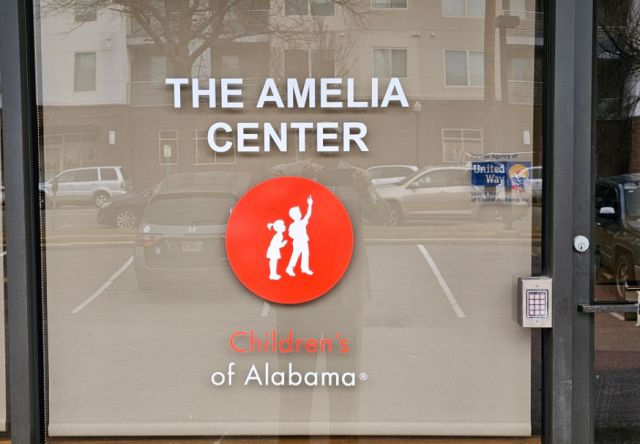By Ryan Michaels
The Birmingham Times
This is another installment in The Birmingham Times/AL.com/CBS42 joint series “Beyond the Violence: What can be done to address Birmingham’s rising homicide rate.” Sign up for the newsletter here.
Robert Smith says he tries to keep a “calm, level head” about counseling. There’s nothing “magical or uniquely special about it,” he said. “It’s just a fancy word for a conversation.”
Smith, executive director of The Amelia Center, a comprehensive grief counseling center at Children’s of Alabama, said that conversation fills in the gaps where friends and family can’t.
“There’s a limit to how many times you can talk to friends or family or, quite frankly, even your spouse, about the death of a child before you start getting the glassy eyes and the impression that it’s just not a topic they want to be spoken to about,” Smith said.
Gun violence has continued to escalate over the past several years in Birmingham, and the city ended 2022 with the families and friends of 144 homicide victims left grieving. The year was deadliest in recent history and only a few homicides short of being the deadliest in the Magic City’s entire history. The highest number of homicides recorded in recent memory was 141 in 1991.
Just this week in Birmingham, five homicides were recorded in just over 48 hours. The five men were killed between 12:40 a.m. Monday and just after 2 a.m. Wednesday.
Emotional Toll
For many families, there is a period of “acute grief” that can last 18 to 24 months after a significant death, Smith said. During that period, grief counselors focus on helping clients handle returns to normalcy, like working and being social, as well as deal with the many firsts that follow the death, such as the first birthday, holiday, or anniversary.
“There’s so much that has to take place in the first year and a half, two years, when the emotion is hard to control,” Smith said. “It’s hard to be around people. It’s hard to even imagine a happy or joyous holiday. Those are the times that people struggle.”
He added that there’s a “natural order” humans expect in how deaths occur. People expect grandparents to die. People expect parents to die.
“The death of a child just disrupts all of our ideas about what’s right and wrong with the universe,” Smith said.
On top of the death of a child, parents also experience what are called “secondary losses,” Smith explained.
“[A parent starts] thinking about, ‘Wow, my kid’s never gonna get married. I’m never gonna have the experience of seeing my kid at his wedding. My child’s never going to have a child. I’ll never have grandkids,’” he said.
Often, parents wonder if the death of their child would have been easier to handle if the cause of death had been different, Smith said. Parents who have watched their children “wither away” with illness sometimes wonder if a car accident would have been better. Parents whose children have been murdered sometimes wish their children had died slowly, giving the parents time to say goodbye.
There is, however, “no way your child dies that makes the process easier,” Smith said. “The answer is, it’s never easy. The only difference is that with each unique type of death of a child, there are extra demons, extra challenges, extra things you have to overcome because each kind of mechanism has its own sets of problems. Suicide has a very different kind of process of healing than a car accident or a homicide.”
For parents who have lost children to homicide, the court proceedings that follow the death often “reopen the wound,” Smith said.
“When we talk about homicide and these families, the thing that really seems to be a problem is when you start adding things like court and justice and trials, having to relive photographs and the scene, hearing terrible things about [the child] that sometimes the defense puts up. … Those can be extremely traumatic and painful,” said Smith, adding that some people should take some time before seeking counseling.
“I have many, many clients that have come in within literally days, if not weeks, of their child’s death. … Certainly, I’m compassionate and listen, but I just don’t know that people are really ready to explore and talk,” he said. “Sometimes we need a few weeks, if not a couple of months, to kind of get our balance, to get our brains kind of functioning again, to survive.”
Patterns
Smith, a licensed professional counselor and educator, said that through his 23 years with The Amelia Center he has learned a great deal from the experience of counseling those who have lost someone.

“You start seeing patterns. You start seeing things that you expect, in terms of a timeline, with how things usually unfold or how humans heal from a loss. You see the choices that previous clients have made that seem to be effective in working with grief and the ones that don’t seem to be,” Smith said.
Those experiences turn counselors into a “clearinghouse of information” about strategies and techniques people can use to better live with their grief. Counselors can then help newly bereaved people understand that “they’re not going crazy,” Smith said.
After a significant death, “casual friends” of the bereaved often drift away when the bereaved is hurting.
“For the most part, in the first year or two, bereaved people just aren’t very fun,” Smith said. “So, if you’ve got social networks [in which] everybody gets something from the relationship, [everyone goes] out and has fun, and you don’t do those things anymore, a lot of those people are going to drift away.”
Even though some fall away, others become closer, Smith said.
“There’s almost a magnetism or a draw between people who have truly suffered. They recognize suffering and have an empathy for it,” he said. “A lot of my clients will discover that people they’ve known, sometimes for years, will finally say, ‘Hey, I’ve have had this experience’ or ‘I’ve lost a child in the past, and here’s how I was able to heal.’”
While many people expect their spouse to be their “absolute, solid form of support,” Smith said that rarely happens.
“It’s hard to be supportive as a spouse when you yourself are also devastated,” he said.
“There Has To Be Hope”
“Grief never ends,” Smith said.
Clients continue grief counseling for different amounts of time, depending on their situation, he explained. Many clients that have come to counseling every other week start coming less.
“I have had clients that I’ve literally seen for years and years, and that doesn’t mean they come every week or even every month,” Smith said “It can be a quarterly check-in. It can be a holiday kind of check-in. … Long-term clients are not unusual in any way.”
The amount of counseling required by clients often depends on the level of support they have from friends and family, Smith said: “I have, certainly, clients who come once or twice and kind of figure out that they’re doing some of the things that are normal and expected. [Because] they have support, ongoing counseling is not necessary.”
Ultimately, “any help is better than no help,” Smith said.
Counselors are only one outlet for people who need support in the aftermath of a significant death, while family, friends, churches and various groups can assist in different ways. No matter what the source of support, though, a positive outlook is necessary for the bereaved to reap benefits.
“Whatever support you’re getting, there must be levels of hopefulness. There must be levels of positivity, [the belief] that things can and will be better,” Smith said. “Certainly, it is important to acknowledge that the struggles are real and the struggles are present. [Still], there has to be hope. Otherwise, [bereaved people may] just kind of drift into nothing.”
The Amelia Center at Children’s of Alabama provides professional counseling for children (age 5 and above) and teens grieving the death of a parent, grandparent, sibling, close relative, or friend. Counseling is also provided for parents grieving the death of a child of any age, ranging from pregnancy loss through adulthood. Support groups for children, teens, and parents are available, as well.
For more information about The Amelia Center, visit https://www.childrensal.org/services/amelia-center or call 205-638-7481.
Previous installments of the series:
Retired Birmingham Police Weigh In on City’s Growing Homicides | The Birmingham Times
John Archibald: Ignoring Murders of Black Males Won’t Make it Disappear | The Birmingham Times
Why Some Birmingham Residents Call Felicia Mearon Before They Call The Police | The Birmingham Times
Some Birmingham City Councilors Not Immune to Gun Violence | The Birmingham Times
MAX Transit, Birmingham Moms Unveil Black History Month Bus Wrap | The Birmingham Times




